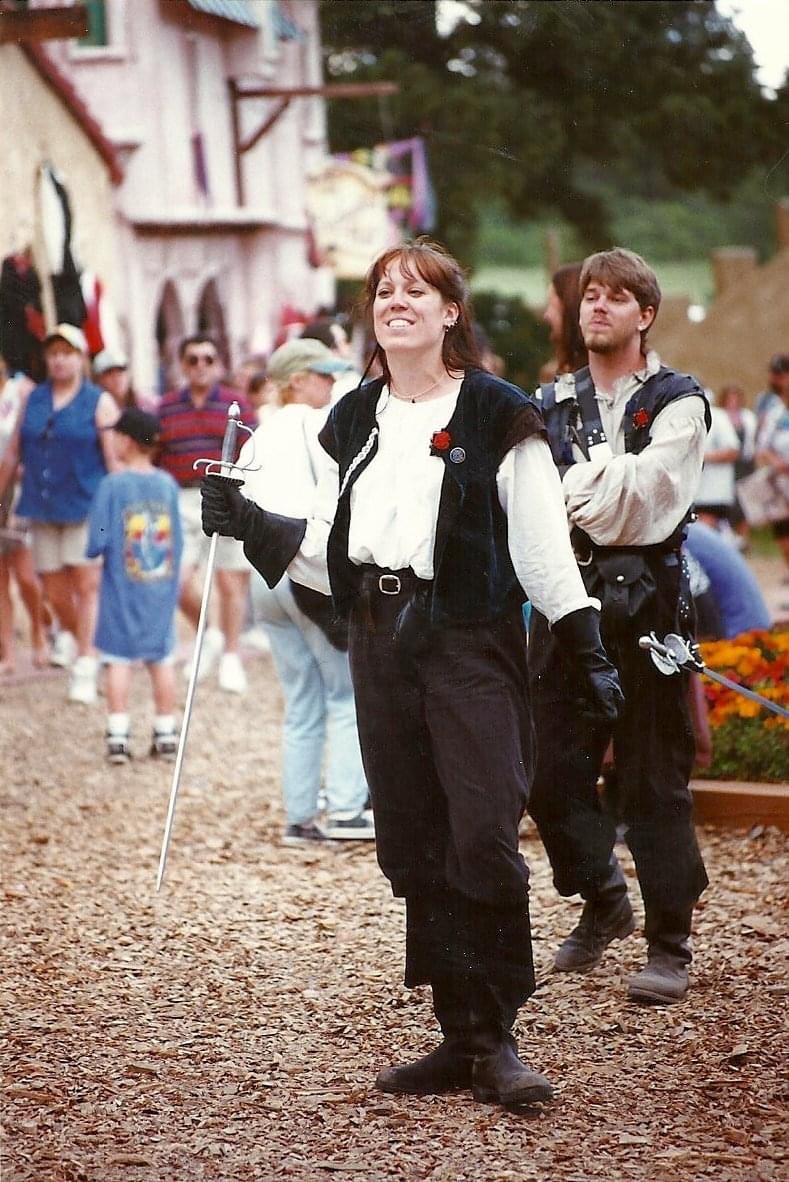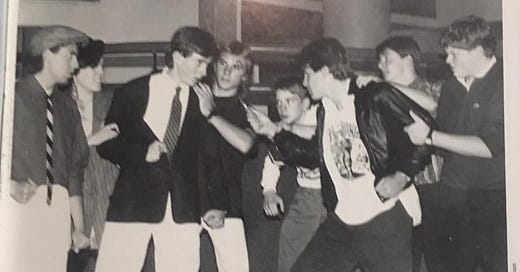Next Time: Chapter 5: One of the Guys
[this is a GLOSS on Chapter 5, which has been linked here for your convenience. This chapter will also be reshared on Substack Notes.]
*
This concept of being One of the Guys began in my 6th of 7 essay series, Problematic Badass Female Tropes. I called this trope One of the Guys, and began the tale of my time with the Band of Young Men as an introduction to that batch of cultural commentary. It’s neither more nor less important, I think, it’s just more of a research/media based piece that focuses on the cultural commentary, whereas my memoir’s chapter is expanded and much more centered on my personal experience. I’ve had one reader say that the chapter is not focused personally enough, and I can see what she’s saying, but I’m still debating if I want to change that 3rd person aspect of the intro or not. I’ll figure it out; maybe it’s a matter of finding an editor who wants to publish it, and see what they say. Here’s another slant on the overarching concept, though, from the Tropes version:
I’ve got more than one personal story of being One Of The Guys. The stage combat, stunt fighting, and martial arts worlds were (and mostly still are) boys’ clubs, and my coming of age as a woman was affected deeply by being steeped in cultures that were teaching me (and my male colleagues) how to be a man. There is still a lovely running personal joke of sorts amongst those closest to me: that I really don’t have much of a handle on the whole girl thing—I kind of suck at being a girl. Which, now in my ripe and seasoned middle age, I’m perfectly okay with. But it is fascinating to look back at myself: the kid tomboy, androgynous goth teen, then in my twenties becoming a member of the Band of Young Men, coming of age as a man. I can see with hindsight the pain there in daily giving up my womanhood, even before I understood what it was.
It’s a weird dichotomy, which I hope I’ve left as ambiguous as it really is: the sexually exploitative manipulation of the situation, including the cigar scene which I hope strikes my readers as just a little rapey, along with my positive memories of my experience of those summers overall. Yes, I was being strung along by the alpha, pressured into sexual competition, and even weirdly used (I’m thinking again about the cigar scene). But withal, I don’t really have an ugly taste in my mouth from being a part of it. I feel more irked at the stage combat organization’s exploitation of my art and talent than any of the boyish shenanigans I joined in the field. It is a paradox, for sure, and I recognize that.
And I do hope that my readers see that last interaction with Ninjaboy and yell at their screens: ‘No!!! Run! Don’t give him your number! Gahhhh!!’ like in a horror movie.

I had an opportunity to buy that sword you see here in my hand above, after that summer’s hard use. It’s a shell-hilted rapier with a steel wire wrap grip (that later broke and was replaced with black leather), and I absolutely loved it. It was made by one Denny Graves, may he rest in peace, who was the best swordcutler in the country at the time, and one of the best in the world. Since it was being so heavily used, it was offered to me at a discount ($200, if I remember correctly), but that was a sum out of my reach. To this day, I sorrow at the loss of that blade.
The more I write about this, and the more I watch my gender fluidity manifest in the years since (especially after my divorce), the more I notice that this One of the Guys thing has been a thing my whole life, since way before the culmination of it in the BoYM. Just for one example: my first role at Boulder High (just after playing Fagin in junior high, let’s not forget) was as part of the Chorus in Romeo and Juliet. One of the primary publicity photos of that show was a posed version of the Montague vs. Capulet scuffle: Tybalt against Mercutio and a few cronies on both sides squaring off. As much as this was several years before I would discover my interest in fighting arts, in this pic I am still the only girl in an otherwise all boy fight scene. A Band of Young Men, plus me. I look back in retrospect at this and laugh. It’s always been there.
Fun Fact about this shot: that kid on the left with the balled-up fists, playing Tybalt, whose arm I’m grabbing? That’s my partner. This is how we met.
In today’s mini-biblio, I’ve got the two Staples works that I used to compare with my Comp students, that I cheekily reference in this chapter’s Author’s Note, just FYI if you’re interested in doing that kind of thing.
You can compare the two, the way I [used to] compare the two versions of Brent Staples’ “Black Men and Public Space” from its essay form and within his memoir, with my Comp students. Am I comparing my work with an excellent, award-winning, eminent essayist? Maybe…
Tell me your thoughts, if you do decide to do this comparison—I’d love to hear about it.
*
TODAY’S BIBLIOGRAPHY:
Staples, Brent. ‘Black Men and Public Space.’ Harper’s, Dec. 1986. (Link)
Staples, Brent. Parallel Time: Growing up in Black and White. NY: Pantheon, 1994.
Zuko, Jenn. ‘Vapulate,’ on Zuko’s Musings: Dec. 2023. (Link)





Seeing the Ren Faire photo . . . you might like the essay on Romeo and Juliet in the latest NYRB (paywalled online but if the library has print copies it's probably nicer to read in print anyway), which opens by talking about gender: https://www.nybooks.com/articles/2025/01/16/rebels-without-a-cause-romeo-and-juliet-sam-gold/
------------------------------------------------
"Women began playing Romeo in the nineteenth century, when one leading man after another failed miserably in a role that calls for both furious sword fighting and acting unmanned. Shakespeare has Romeo kill first Tybalt, then Paris, but also has him tell Juliet, “Thy beauty hath made me effeminate,” and has him collapse, weeping, as the Friar chastises him: “Art thou a man?… Thy tears are womanish…. Unseemly woman in a seeming man.” It apparently took a gay actor like Cushman (though she never came out publicly) to render these extremes convincingly in an age of Manifest Destiny, when America experienced a crisis of manhood, as a masculinity that embraced moderation, virtue, and domesticity was elbowed out by a more aggressive one characterized by physicality and domination.
Between the 1820s and the Civil War more than a dozen women played Romeo on stages in New York City alone; The New York Times declared that “there is in the delicacy and gentleness of Romeo’s character something which requires a woman to represent it” and that the character’s “luscious language…seems strange on the lips of a man.” Fifteen years after that Boston performance the fires that had fueled Manifest Destiny were largely extinguished, having consumed the lives of some 700,000 young men who fought for the Union and the Confederacy. Female Romeos soon vanished from the stage, and this episode in theater history was all but forgotten, along with what it revealed about ultimately tragic fissures within the culture."
What fine writing. A life explored is a good life. A life explored publicly is a generous one.